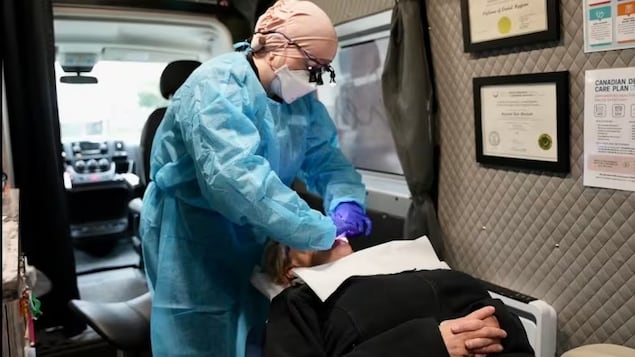- Home
- Politics
Canada’s dental care plan begins today. Here’s what you need to know

Shannon Maitland, a dental hygienist in the Ottawa is seen in personal protective equipment with a patient in her mobile dental van. Shannon Maitland, a dental hygienist in the Ottawa area, has signed up as a provider of the CDCP. She said she has about 20 patients waiting to receive care under the national program but is waiting a few weeks before seeing them while the program gets underway.
Photo: (Toni Choueiri/CBC)
Seniors 70 and older can be covered starting May 1, but some could be stuck waiting for care
The Canadian Dental Care Plan (CDCP) begins covering 1.7 million seniors today — but many patients may have to wait a while to get their dental visits covered.
The massive public oral health-care insurance program will eventually cover one quarter of Canadian residents who don't have private dental plans, at a cost of $13 billion over the next five years. Ottawa is rolling out eligibility gradually (new window), starting with seniors.
They are very excited to have their teeth cleaned because it has been many years,
said Shannon Maitland, an independent dental hygienist who runs a mobile clinic out of Carleton Place, just outside of Ottawa.
Maitland is one of 5,000 oral health-care providers who have signed up so far for the CDCP. But she won't start seeing patients under the program for several weeks because she's decided to wait and see how the initial rollout goes.
Dentists, denturists and hygienists have generally supported a national, publicly funded dental insurance program, arguing it will fill the gap of nine million low- and middle-income Canadians who have to pay for oral health care out of pocket.
But while coverage for seniors 70 years and older begins May 1, some patients are finding out their dentist isn't participating. Changes Ottawa made that will allow dentists to still process claims without registering don't come into effect until July. On top of that, it will also be another six months until certain dental services that require pre-approval are covered, like crowns and partial dentures.
Since the plan was announced in December, there has also been confusion over who qualifies, how the plan affects other insurance programs and whether enough dentists will sign up to meet demand.
Here are answers to some common questions about the plan.
How can I find a professional offering the CDCP?
The federal government contracted insurance provider Sun Life to administer the program. The company recently launched a searchable database of available CDCP providers. (new window)
According to their associations, there are about 30,500 oral health-care professionals who could sign up to offer the program, including roughly 26,500 dentists, 1,700 independent hygienists and 2,400 denturists.
That means only about 16 per cent of oral health-care providers have signed up so far.
Why won't my dentist sign up?
Some dentists have been reluctant to register (new window) for the program because Ottawa wants them to sign contracts to provide care and they think the program will require an unreasonable amount of paperwork.
The vast majority of dentists are still waiting for more information before they agree to participate,
said Dr. Joel Antel, a Winnipeg dentist and the newly elected president of the Canadian Dental Association.
He said he hasn't signed up to provide the CDCP in his own clinic.
I have to admit to a certain amount of disappointment, because I was involved in this process very early on and it looked really promising,
he said.
Then at some point, it just took a turn and became complicated and onerous — and unnecessarily so.
Will I have to switch dentists?
Dentists have the right to choose if they will accept patients through the CDCP, as they can with existing public programs.
If the dentist isn't participating … they can't go to those dentists,
Dr. Antel said. So they may have to change dentists where they've had a long-term relationship built up.
Can I access CDCP at a dentist that hasn't registered?
Two weeks ago, Health Minister Mark Holland attempted to address concerns when he announced (new window) that oral health-care providers could bill the program directly without formally signing up.
That option won't be available until July. That means if your dentist isn't a registered provider, but will still accept you under the CDCP, you won't be able to see them until the summer.
On Tuesday, Holland pushed back against the dental associations' continued criticism of the program, saying Ottawa listened to their concerns and simplified the CDCP.
That's nuts. Just to be fair ... at some point let's call a spade a spade here. Are you crazy?
he said outside a cabinet meeting in the House of Commons.
Holland said the federal government made the system easier to use while still keeping the necessary checks in place to guard against abuse, such as allowing Ottawa to audit claims.
We created a normal … claim process that exists in every other insurance claim process everywhere, and they wanted us to simplify it. We did,
Holland said.
We've got it down now to a process that's as simple and as basic as anything else out there, if not simpler.
WATCH: Health minister pushes back against dental associations' claims:
Health minister calls dental associations’ claims about national program 'nuts'
Federal Minister of Health Mark Holland says the federal government has worked to adjust the insurance claim process so it’s ‘as simple and as basic as anything else out there.’ Some dental associations have raised concerns about the administrative burden of the national dental care program, which is set to begin Wednesday.
How does the CDCP compare to other provincial plans?
If you have access to dental care through an existing public program, you can still qualify for the CDCP. That could be a provincial program offered through social assistance, disability, or national programs like the Non-Insured Health Benefits program for First Nations and Inuit.
Dr. Brandon Doucet, a Nova Scotia dentist who has advocated for a national public dental insurance plan, said he understands many dentists' reluctance — and a lot of it has to do with their experiences trying to provide the public programs in place right now.
The existing public dental programs are very, very meagre and a lot of dentists are frustrated because the fees those programs pay out are often under half of what private plans pay,
Doucet said.
By comparison, the CDCP covers more services and at a better rate than existing public plans, Doucet said. In Nova Scotia where he practices, Ottawa pays around 89 per cent of what the fee guide suggests. Those fee guides are put out by provincial dental association, which dentists reference when they bill private insurance companies for their service.
Doucet says he thinks more dentists will sign up once the program gets underway when they realize they may lose money by not accepting CDCP patients.
Many dentists just do not and have never wanted public dental care, similar to physicians' opposition to universal health care in the 1960s,
he said.
Doucet said Canada's public spending on dental care is about six per cent of the total spent on all oral care services — substantially less than the 10 per cent public share in the U.S., and the 57 per cent in Germany. The national program will bring that number closer to about 25 per cent.
Will I get free dental care?
As Doucet mentioned, the federal government has created its own fee grid of what it will pay oral health-care providers for each procedure, which is a slightly lower rate than the guides put out by provincial associations dentists.
But this is not free
dental care.
Like private plans, the CDCP only covers a certain amount of the cost of services, meaning a dental care provider can still charge their patient the difference. Patients whose income (or combined family income) is under $90,000 should qualify but the coverage is only partial if you make between $70,000 and $90,000. More details can be found here. (new window)
What's covered?
Most routine dental care will be covered under the CDCP, including cleanings, X-rays, fillings, root canals and dentures.
Some of the more complex dental services — such as partial dentures and crowns — will require federal pre-authorization of payment. Pre-authorized services won't be covered until November 2024.
There are some things that certainly we were hoping to get all launched at the same time,
said Jaro Wojcicki, a denturist in Penetanguishene, Ont., and president of the Denturist Association of Canada.
The government did say it's been difficult to manage having everything launch May 1. So they made some exceptions and some decisions ultimately on splitting up some of the procedures.
Oral health-care providers will need to educate their patients to co-ordinate the treatment over this period, he said.
You can learn more about what's covered and when on the government's website here. (new window)
When will I be eligible?
The federal government is expanding eligibility for the CDCP gradually. As of May 1, Canadian residents 70 and older can get their oral health-care services covered by the program, and seniors aged 65 to 69 can sign up.
In June, people with disabilities and children under 18 will be included. (That's also when an interim dental benefit (new window) that has been covering kids under the age of 12 since December 2022 will be replaced by the CDCP.)
The program will be available to all eligible Canadian residents starting in 2025, according to the federal government.
To qualify, a patient can't have access to any existing private dental insurance, regardless of how comprehensive your existing private coverage is. Ottawa has clarified (new window) that if you went out and purchased private insurance on your own, you will qualify for the CDCP once that plan is no longer in effect.
The government passed legislation last summer that requires employers to declare to the Canada Revenue Agency if they offer workers a private dental plan. This will enable Ottawa to audit claims through the CDCP.
Marina von Stackelberg (new window) · CBC News




